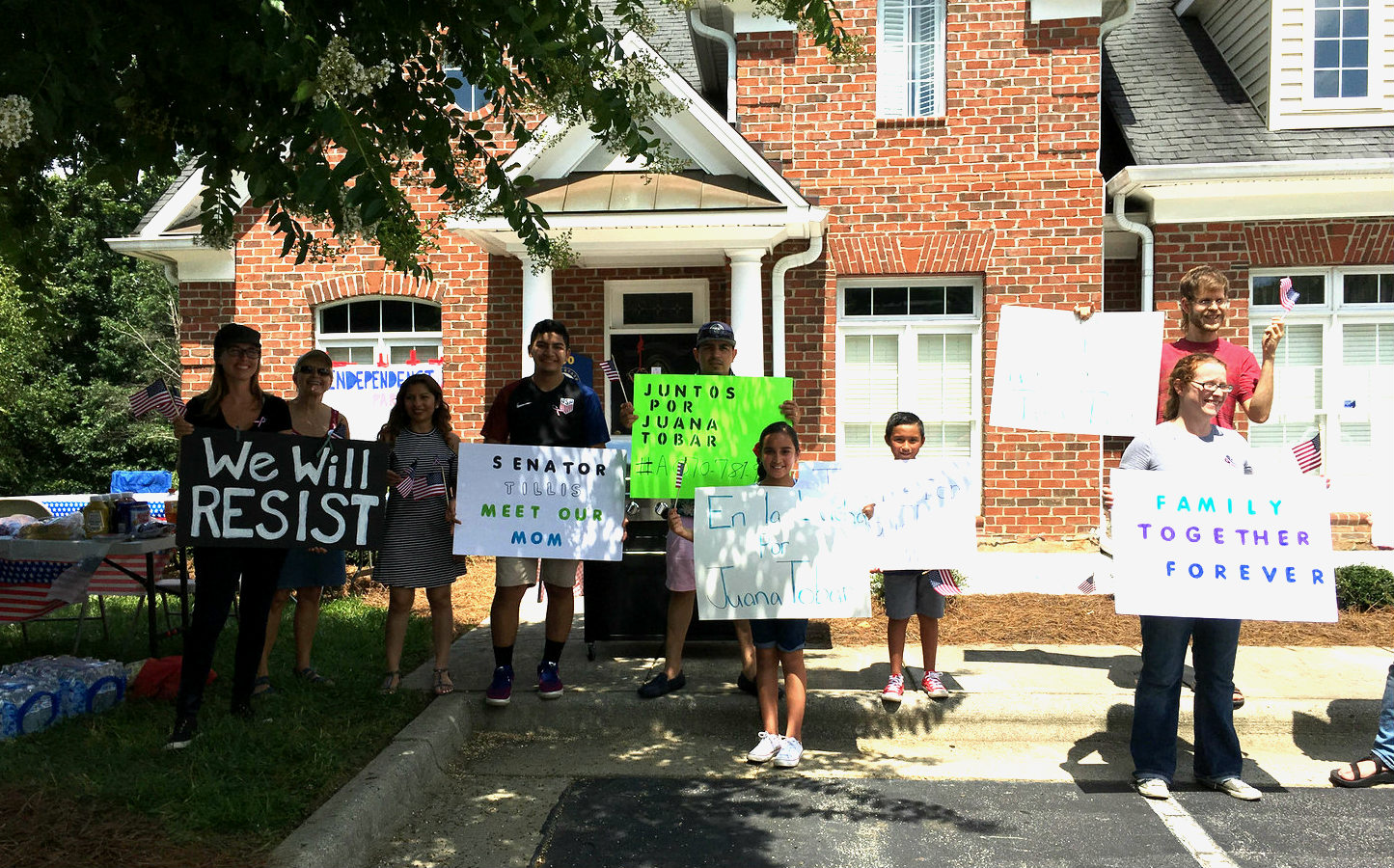
On the Fourth of July, dozens of Greensboro, North Carolina community members took part in a protest outside of Sen. Thom Tillis's office in support of Juana Luz Tobar Ortega, who remains in sanctuary. Nikki Marín Baena
Community members continue efforts to keep Juana in the U.S. with her family where she belongs.
It was an odd scene for the Fourth of July in High Point, North Carolina—40 people milling around an office park, all with cellphones stuck to their ears, the afternoon sun beating down on platters of food and tubs of ice cream on folding tables set up in the parking lot. A large emblem posted on the front of the building gave more away: “U.S. Senator, Thom Tillis.” The festive phone-callers were all leaving voicemails on his answering machine in Washington, D.C. to say, “Sorry we missed you at the barbecue we held at your office.”
"Independence Day for Juana" was the most recent action that community members have held to draw attention to Juana Luz Tobar Ortega, who was ordered to leave the country at the end of the May but instead sought sanctuary at St. Barnabas Episcopal Church in Greensboro. Juana had arrived in North Carolina in 1993, fleeing threats of violence in Guatemala. She has a U.S. citizen husband, two citizen children, two children who are DACA recipients, and two nine-year-old grandchildren. She had also worked as a seamstress at the same textile company for eight years, and is active in her son’s high school and her local church.

In February of this year, Juana and her family attended a Know Your Rights workshop organized by the AFSC Immigrant Rights Program in North Carolina. They reached out to me when Juana received her surprise deportation order in April. I walked her family through their options. AFSC had previously collaborated with St. Barnabus Church in 2016 to provide sanctuary to an individual who ended up not needing it, so we were able to work quickly with the congregation to establish a relationship with Juana’s family, prepare them for her life in sanctuary, and prepare them for going public with their decision to host her.
Juana was detained at her workplace in 2010, and Immigration and Customs Enforcement (ICE) had since required her to check in at the regional office in Charlotte every year. Juana complied, going for her annual check-in and receiving six deferrals from ICE ever year since. That was until May of this year, when ICE officers unexpectedly ordered her to leave the country.
Since then, Juana’s family and supporters have focused their advocacy efforts squarely on Sen. Tillis, who as recently as June told a Senate subcommittee that he thought undocumented immigrants like Juana should be “released into the community” rather than targeted by ICE. But Tillis’ staff have so far been unwilling to advocate more firmly on Juana’s behalf, declining to say whether they think she should be forced to leave the country after 24 years here—20 of those in the same house.
Tillis had declined invitations to meet with Juana or her family, and our Independence Day barbecue was timed to coincide with the Senate’s Fourth of July recess, when the senator would be home in his distict.

“My parents have spent over $15,000 in the last two decades trying to resolve her case,” said Lesvi Molina, Juana's daughter. “We would rather have a real fix for her status, but if she wasn’t a priority for removal last year, why should she be forced to leave now?”
In the first half of 2017, ICE arrests were up around 40 percent from the same time last year. That includes hundreds of people in North Carolina like Juana who thought they were safe until they suddenly became targets for deportation by ICE. Many families who were previously not targeted by ICE have been detained as “collateral” arrests on their way to work or school.
Some congregations have decided to rethink what they’re able to do to support families like Juana’s. Some have moved from simply being inactive on the issue to supporting a host congregation like St. Barnabas by signing up for shifts to accompany Juana. Others have made the choice to become hosts by repurposing rooms into living spaces for individuals. Minerva Garcia, another North Carolina resident under threat of deportation, became the second person to seek sanctuary in Greensboro, also through a church.
For now, Juana continues on in her temporary residence at St. Barnabas—in a room that used to be the church’s nursery—nearly an hour from her home. “I’ll stay here until I can hug my grandchildren at home again,” she said, mentioning how hard it has also been to be so far away from her teenage son. “It’s better to see them once a week than not see them at all.”
While in sanctuary, Juana is learning English and teaching church members to make pupusas. And together with her campaign team, which includes AFSC, she is planning next steps for getting the senator to put his stated beliefs into action. We’re not asking for much. Just a straight answer. Does he think she should stay with her family, or return to a place she hasn’t been in over two decades?
As part of those efforts, we’re planning a simultaneous day of action on Sept. 28 in three locations: Greensboro, Winston-Salem, and Durham, where all three people in sanctuary in North Carolina are currently residing.
If you’d like to support Juana and her family, call Sen. Tillis at 202-224-6342. Ask him to tell supporters whether or not he thinks Juana Luz Tobar Ortega should be forced to leave her home. And let him you know that you believe that Juana—and countless other immigrants across the U.S.—belongs here and deserve to feel welcome and safe in our communities.
You can read more about Juana here, and share social media posts to show your support using the hashtags #JuanaShouldStay and #SanctuaryEverywhere.